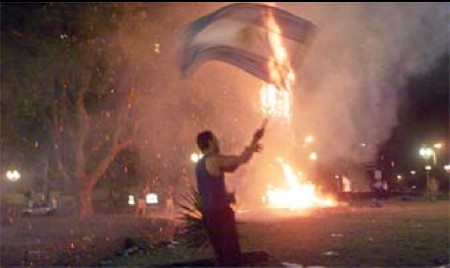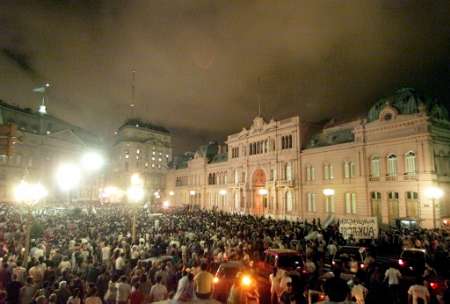 December the 19th was the turning point, the day when the Argentinean people said "enough!" The stage was set the day before, when people began looting shops and supermarkets so they could feed their families. The president, Fernando De La Rua, panicked. Twelve years ago, major looting toppled the government, and now, within the Argentinean collective memory, looting is linked to the collapse of regimes. De La Rua declared a state of emergency, suspending all constitutional rights, and banning meetings of more than three people. That was the last straw. Not only did it bring back traumatic memories of the seven year military dictatorship which killed over 30,000 people, but also it meant that the state was taking away the last shred of dignity from a hungry and desperate population - their freedom.
December the 19th was the turning point, the day when the Argentinean people said "enough!" The stage was set the day before, when people began looting shops and supermarkets so they could feed their families. The president, Fernando De La Rua, panicked. Twelve years ago, major looting toppled the government, and now, within the Argentinean collective memory, looting is linked to the collapse of regimes. De La Rua declared a state of emergency, suspending all constitutional rights, and banning meetings of more than three people. That was the last straw. Not only did it bring back traumatic memories of the seven year military dictatorship which killed over 30,000 people, but also it meant that the state was taking away the last shred of dignity from a hungry and desperate population - their freedom.
On the evening of December 19th, our friend Ezequiel was on the phone with his brother who lives on the other side of Buenos Aires. They were casually chatting, when his brother suddenly said, "Hang on, can you hear that noise?" Ezequiel strained to hear a kind of clanging sound coming through the receiver." Yes, I can hear something on your side of the city but nothing here." They continued talking, and then Ezequiel paused, and said, "Wait, now I can hear something in my neighborhood, the same sound...." He ran to the window.
 People were standing on their balconies banging saucepans, were coming out onto the sidewalks banging pots; like a virulent virus of hope, the cacerolazo, which began as a response to the state of emergency, had infected the entire city. Before the president's televised announcement of the state of emergency was over, people were in the streets disobeying it. Over a million people took part in Buenos Aires alone, banging their pots and pans and demanding an end to neoliberal policies and corrupt governments. That night the finance minister resigned, and over the next 24 hours of street protest, plainclothes policemen killed seven demonstrators in the city, while 15 more were killed in the provinces. The president resigned shortly thereafter, and was evacuated from the presidential palace by helicopter.
People were standing on their balconies banging saucepans, were coming out onto the sidewalks banging pots; like a virulent virus of hope, the cacerolazo, which began as a response to the state of emergency, had infected the entire city. Before the president's televised announcement of the state of emergency was over, people were in the streets disobeying it. Over a million people took part in Buenos Aires alone, banging their pots and pans and demanding an end to neoliberal policies and corrupt governments. That night the finance minister resigned, and over the next 24 hours of street protest, plainclothes policemen killed seven demonstrators in the city, while 15 more were killed in the provinces. The president resigned shortly thereafter, and was evacuated from the presidential palace by helicopter.
Within a fortnight four more governments fell. Argentina was now set on a major high-speed collision course, with the needs and desires of its people on one side, and the demands of the IMF, the inept government, and global capitalism on the other.